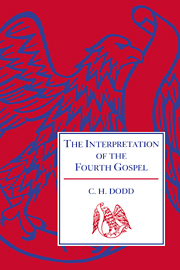Book contents
- Frontmatter
- Contents
- PART I THE BACKGROUND
- PART II LEADING IDEAS
- 1 Symbolism
- 2 Eternal life
- 3 Knowledge of God
- 4 Truth
- 5 Faith
- 6 Union with God
- 7 Light, Glory, Judgment
- 8 Spirit
- 9 Messiah
- 10 Son of Man
- 11 Son of God
- 12 Logos
- PART III ARGUMENT AND STRUCTURE
- APPENDIX: Some considerations upon the historical aspect of the Fourth Gospel
- Index Locorum
- Index Nominum
9 - Messiah
from PART II - LEADING IDEAS
Published online by Cambridge University Press: 10 December 2009
- Frontmatter
- Contents
- PART I THE BACKGROUND
- PART II LEADING IDEAS
- 1 Symbolism
- 2 Eternal life
- 3 Knowledge of God
- 4 Truth
- 5 Faith
- 6 Union with God
- 7 Light, Glory, Judgment
- 8 Spirit
- 9 Messiah
- 10 Son of Man
- 11 Son of God
- 12 Logos
- PART III ARGUMENT AND STRUCTURE
- APPENDIX: Some considerations upon the historical aspect of the Fourth Gospel
- Index Locorum
- Index Nominum
Summary
The first chapter of the gospel, after the end of the Prologue, is occupied by a series of ‘testimonies’ to Jesus, leading up to a solemn declaration on His part. The evangelist has so composed this introduction as to bring in the principal titles given to Jesus in the primitive Church: ‘Messiah’, or ‘Christ’ (i. 417, both Aramaic and Greek forms being given, and the title being further defined as ‘He of whom Moses wrote in the Law, and the prophets’ (i. 45); ‘King of Israel’ (i. 49); ‘Son of God’ (i. 34, 49); ‘Son of Man’ (i. 51). All these recur in other parts of the gospel, and with them the titles ‘The Holy One of God’ (vi. 69), and ‘The Coming One’ (6 ρχóμεvō, xii. 13), which also occur in the other gospels (Mark i. 24, Luke iv. 34, Matt. xi. 3, xxi. 9, Mark xi. 9, Luke vii. 19, xiii. 35; cf. Heb. x. 37). In none of the Synoptic Gospels, and indeed in no other New Testament writer, do these Messianic titles receive such prominence as here. This prominence is particularly marked in the introductory chapter. It is as though the evangelist had intended to emphasize the fact that his own distinctive teaching rested directly on the messianic beliefs of the primitive Church, and with this aim had begun his work by calling the roll of the traditional messianic titles of the Lord. For in primitive Christian usage they are all messianic, though for the most part they cannot be shown to have been current in this sense in pre-Christian Judaism.
- Type
- Chapter
- Information
- The Interpretation of the Fourth Gospel , pp. 228 - 240Publisher: Cambridge University PressPrint publication year: 1953



